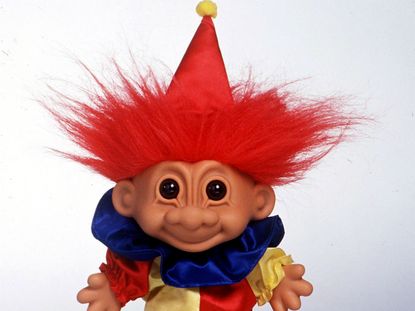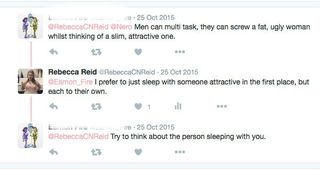What it really feels like to be trolled online
It's not just celebrities who get trolled

It's not just celebrities who get trolled
I'm usually a phone addict. I can't go more than an hour without checking Twitter. But a few months ago that changed, instead I could barely bring myself to look at my phone. When I did manage to take enough deep breaths to open my inbox, or check my texts, it would usually end with me in floods of tears.
Why? I was being trolled.
I used to think that being trolled was the preserve of celebrities, that you had to be a super rich, super gorgeous famous person for anyone to be interested in sending you mean messages. And perhaps a while ago that was true. But these days? Not so. And for me, having the gall to be a woman who expresses an opinion on the internet was quite enough.
It happened because I agreed to engage in a university debate with well-known right wing blogger Milo Yiannopoulos who was yesterday banned from Twitter for violating the code of conduct and inciting hatred against actress Leslie Jones. Milo tweeted my articles to his three hundred thousand followers, with a scathing commentary, and it all went from there there. My writing, my looks, my politics. It was all fair game.

I watched what was happening to Leslie earlier this week and I understood on some level. My experience was not as extreme as hers, but it had the same starting-point. She'd dared to engage with people who said her film was a failure - a slap in the face to the Ghostbusters franchise and had ruined their childhoods - and she was being punished for it.
Her punishment was days of the most poisonous abuse you could ever imagine facing. That's the thing about large-scale trolling. It doesn't stop. There's thousands of people saying horrific things to you and they live all around the world. Just as the British trolls finish telling you you're an ugly bitch and go to sleep, the Americans are waking up and it starts all over again.
Marie Claire Newsletter
Celebrity news, beauty, fashion advice, and fascinating features, delivered straight to your inbox!
'Why do you look?' people ask you. 'Can't you just ignore it?' It's almost impossible to explain this, but basically, no, you can't. These people are invading your space. Your phone, which used to be a way to interact with people you love, is being invaded by cruel messages. To start with you try and interact. You want these people to understand that they're talking to a real person and hurting their feelings. You assume that people are human and that if you explain to them why they're wrong about you they'll stop, they'll treat you like a person.
They won't.

I told one troll who was calling me fat that I'd suffered from bulimia as a teenager. I asked him to stop saying things that really hurt me, especially when I'd had such a difficult relationship with my body then. He called me pathetic and told me to stop whining.
There's a typical line from trolls that they can't understand why you're so upset about it. When you complain about it they act as if you're being utterly unreasonable. There's a terrifying lack of empathy. But then, if you've never had that volume of messages, continuously spilling over from Twitter onto your Facebook account and your emails, then perhaps it's impossible to realise how much your words can hurt someone.
When I met Milo Yiannopoulos, I enjoyed his company. He was funny - charming even. I imagine I'd say something similar about all of the people who were calling me an 'ugly feminazi' if I met them in real life. There's something about hiding behind a screen that brings out a very different side of a human. You feel shielded from reality, you start to think you can be as honest as you like. And perhaps because you feel voiceless, perhaps because you're unhappy or maybe because you're very unhappy, you start being cruel to strangers because causing those strangers pain makes you feel better.

When you complain about abuse on the internet it's quite common to get a mass of replies telling you that if you don't like it you should leave Twitter, that being trolled is just a normal part of being on the internet. It's lead me to develop a theory that trolls are people who, when they were bullied or teased or hurt as children, were told to grow up, toughen up and see it as character building. Perhaps if we stopped telling people that being called names and made to feel small is normal as children, it will stop happening on the internet when they are adults.
The banning of Milo Yiannopoulos from Twitter has been held up as a triumph against trolling. And to some extent it is. Yet I've still been nervous to express my thoughts on the matter on Twitter. Sadly, it's a bit like getting rid of a dictator. The figurehead is gone, but there's always someone else waiting in the shadows, ready to take over. I very much hope that I'm wrong, but I can't help thinking that the endemic trolling problem on the internet is much, much deeper than just one frustrated right-wing blogger.
The leading destination for fashion, beauty, shopping and finger-on-the-pulse views on the latest issues. Marie Claire's travel content helps you delight in discovering new destinations around the globe, offering a unique – and sometimes unchartered – travel experience. From new hotel openings to the destinations tipped to take over our travel calendars, this iconic name has it covered.
-
 Bulgari Serpenti: Uncovering the beauty of a bijoux bag
Bulgari Serpenti: Uncovering the beauty of a bijoux bagBy Jessica Bumpus
-
 Ever wondered, what kind of workout is Pilates? Your guide to the viral workout loved by celebs and PTs
Ever wondered, what kind of workout is Pilates? Your guide to the viral workout loved by celebs and PTsYour need-to-knows.
By Abbi Henderson
-
 What is it about The Row that makes it so covetable?
What is it about The Row that makes it so covetable?Our Fashion Editor charts the rise and rise of the stylishly stealthy brand
By Natalie Hughes